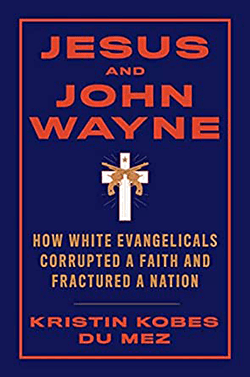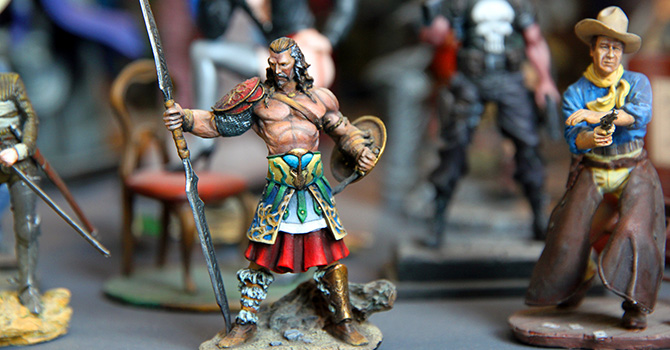After a weekend at Walter Reed National Military Medical Center for treatment for COVID-19, President Donald Trump returned to the White House.
“Don’t be afraid of Covid,” he tweeted. “Don’t let it dominate your life.”
The type of masculinity Trump showed in this moment and its relationship to Trump’s evangelical support is the topic of Kristin Kobes Du Mez’s recent book, “Jesus and John Wayne.”
 In the book, Du Mez argues that the well-reported, seemingly contradictory evangelical support of Trump throughout his 2016 campaign and then presidency is completely logical, considering the evangelical affinity with militant masculinity.
In the book, Du Mez argues that the well-reported, seemingly contradictory evangelical support of Trump throughout his 2016 campaign and then presidency is completely logical, considering the evangelical affinity with militant masculinity.
Evangelicals formed an idea of Christ from figures like John Wayne and Theodore Roosevelt. This Christ was a rugged warrior, willing to fight for the faith and the nation. But the embrace of this warrior Christ has led to problems, evidenced in both church leadership and a willing allegiance to Trump, she writes.
 Du Mez is a professor of history at Calvin University and is also the author of “A New Gospel for Women: Katharine Bushnell and the Challenge of Christian Feminism.”
Du Mez is a professor of history at Calvin University and is also the author of “A New Gospel for Women: Katharine Bushnell and the Challenge of Christian Feminism.”
She spoke with Faith & Leadership’s Chris Karnadi about her new book, the impact of evangelicalism’s masculinity on the 2020 election, and the effect it may have on the future of evangelicalism. The following is an edited transcript.
Faith & Leadership: What are some of the roots of patriarchy in evangelicalism?
Kristin Kobes Du Mez: Within Christian tradition generally, there is a long-standing tradition of patriarchy, patriarchal teaching, patriarchal interpretations of the Scriptures. But there are also traditions of Christian feminism -- of understandings of the gospel as undermining patriarchy.
My first book is on the history of Christian feminism, and I think that really gave me eyes to see contemporary American Christianity and conservative evangelicalism in a slightly different light.
I know for a fact that throughout American history and throughout Christian history, there have been devout, Bible-believing Christians -- including some who have identified as evangelicals and in fact fundamentalists -- who take the Scriptures very seriously and read it in a very different way with regard to patriarchy, with regard to gender and power, and with regard to power more generally.
I think that was an important backdrop for this research. It helped me to problematize the extreme patriarchal constructions of Christianity within white evangelicalism in the last half-century or so. You can’t simply dismiss the development as biblical or scriptural issues, because then evangelicals would get a pass.
If you assume that Christianity is just patriarchal, then patriarchy in white evangelicalism doesn’t become a historical problem and doesn’t require an explanation or an investigation.
In fact, many scholars of evangelicalism who happen to be evangelicals themselves have treated patriarchy, have treated gender complementarianism, in that way: that it’s biblical and doesn’t require a historical investigation or critical analysis.
Coming at it from a different perspective, understanding that what Christians think is different at various times and places, then it becomes a historical problem. Why now? Why in this particular guise? Why is it taken to this extreme? What’s going on here historically and culturally?
F&L: Can you talk about your personal journey toward writing this book? Was the 2016 election a kind of spark or impetus for researching and writing it?
KKDM: The research for this started more than 15 years ago. It was just after I arrived at Calvin. I was teaching a course in U.S. history, and I had a unit on Teddy Roosevelt. I thought it was a great way to show students how gender worked in American history.
The ideas of masculinity could be linked not just to religion but to economic development, to war and militarism, to foreign policy. After that lecture, a couple of guys from the class came up to me and said, “Professor Du Mez, there’s this book that you have to read.” It was John Eldredge’s “Wild at Heart.”
Eldredge opens that book with a quote from Teddy Roosevelt. They saw that Eldredge was doing something very similar to what I had been describing in terms of this muscular Christianity in the early 20th century related to militarism and war.
So I started doing more investigation. This was right during the Iraq War, when we saw survey data showing that white evangelicals were disproportionately supporting the Iraq War, supporting preemptive war in general, condoning the use of torture.
As a historian trained in the analysis of gender, I was immediately intrigued. How do these conceptions of militant muscularity that I was reading in “Wild at Heart” -- and it turns out there are all kinds of other books making much the same point -- how does that connect to what we’re seeing on the global stage in terms of this aggressive foreign policy?
That was a long time ago, and I ended up setting the book aside for a time, for a couple of reasons. First, I was incredibly disturbed by what I was discovering, and as a Christian myself, I was unsure that I wanted to spend years in that space. But I also was plagued by this question of how mainstream this masculinity was, because the stuff I was uncovering was horrifying.
These were the Mark Driscoll years, and this kind of muscular militant Christianity was really pretty much on steroids. I was like, “Am I going to be shining this bright light on the dark underbelly of American Christianity? Is this some fringe movement?”
I kept tabs on all the guys that I had been reading, and in the ensuing years, I saw one after another become implicated in abuses of power and sexual abuse scandals, so I kept taking notes.
But it was really in 2016, with the release of the “Access Hollywood” tape and continued evangelical support of Trump even in light of those revelations, that it clicked for me. I had seen this toxic masculinity before, and that’s when I dusted off that old research and decided to write the book that became “Jesus and John Wayne.”
F&L: Why John Wayne?
KKDM: Fifteen years ago, I started reading Eldredge and all the other copycat books. Eldredge’s book sold 4 million copies, though it spawned an industry of books that almost downright plagiarized his formula.
What struck me at the time was that for all their talk of being Bible-believing Christians, when it came to these guides on Christian manhood, there was a Bible verse sprinkled here or there, but it really wasn’t based on biblical teaching.
Instead, it was based on Hollywood heroes, mythical warriors, soldiers and cowboys. William Wallace from Mel Gibson’s “Braveheart” was a favorite, but John Wayne kept popping up too.
John Wayne is this icon of American manhood, and these books held him up as this ideal Christian man -- which is, of course, absurd. He was not an evangelical. He did not live a moral Christian life.
But I saw the importance of culture in shaping evangelical ideals, which they then called “biblical,” and then also the importance of culture in dispersing this ideal Christian masculinity. I wanted to share this cultural history, which shows the influence of secular culture on evangelicalism and on evangelical gender ideals, and John Wayne was so significant in that.
He really is the symbol of a rugged, militant, “traditional Christian” manhood. It’s good guys versus bad buys, using violence to achieve order, and the ends will justify the means. All of that really is what he signified on screen and what they loved about him.
F&L: Can you talk more about the role the press and the publishing industry have had in creating this modern evangelicalism?
KKDM: Going back to the 1940s, the National Association of Evangelicals came together for the first time, and they wanted to reassert evangelical power. They felt like they’d been marginalized in the 1920s, 1930s, and they felt like they had a lot to offer to the country. They believed that they were the most faithful Christians in the nation.
They believed that liberal Protestants, the mainline churches, had fallen away from Christianity, and so they believed that they had a special role to play in keeping America Christian.
They understood that they needed to do that by expanding their reach. They couldn’t just be in these kind of rural areas. They really needed to first unify, because they were scattered across the country, in various Bible colleges, institutes and flourishing churches. The whole point of NAE was bringing these resources together.
But as they came together, they knew that they needed to take hold of the mass media and reach Americans through radio and through magazines. They had great plans through organizations that would unite all these different factions, and so this is where we see the rise of Christian policy, really, as we know it today.
The Christian Booksellers Association started up right around this time, and that really changed the religious landscape in interesting ways. Evangelicalism had never been purely denominational. It had always transcended denominations. It was a revival movement.
What the CBA did is it consolidated Christian publishing and then distributed through networks of family bookstores, Christian bookstores, that were then popping up all over postwar America.
Here I’m drawing on the research of Daniel Silliman. His work is great, and he showed how this changed the substance of Christian publishing. Before that, a lot of Christian books had been distributed through denominational structures, so they were very specific theologically to that denominational tradition.
You can’t do that when you’re going for mass distribution, though. The Lutherans aren’t going to like what the Presbyterians are writing, and you’re not going to sell your books.
But if you focus on Christian living, then you can find this common ground. That’s when we start to see these books that are not theologically deep, because that would splinter your market. Instead, we see books on how to raise Christian kids, how to have sex, how to be a Christian wife, how to be a Christian husband.
This Christian living genre really takes off, and then Christian fiction and inspirational books, but not the meatier theological books. The market itself changes the content, and I think eventually that ends up really kind of redefining what it is to be an evangelical.
F&L: Has patriarchal evangelical Christianity influenced mainline Protestants?
KKDM: Yes, it absolutely has. Evangelicalism has never been contained within denominational, or nondenominational, structures. Because I define evangelicalism as a consumer culture, it’s easy to see how this culture has infiltrated mainline churches.
How many mainline Christians have listened to Dobson’s Focus on the Family on the radio or shopped at a Christian bookstore? What devotionals or books on Christian living are mainline Christians reading?
Many mainline Christians, especially in small towns and rural areas, are deeply influenced by this evangelical popular culture. Many, I would argue, are even functionally evangelical.
F&L: 2016 was a big moment in seeing how militant masculinity, evangelical masculinity, was playing a role in the election. But coming up to the 2020 election, how do you see patriarchal Christianity playing a role?
KKDM: I think it’s still playing much the same role, in that for many evangelicals who decided to support Trump in 2016, there simply wasn’t the conflict that many others thought there would be. There wasn’t the tension that many outsiders assumed that the “family values” of evangelicals would be feeling to support a man who so clearly did not seem to exhibit any of the traits of traditional Christian morality.
But once you understand this history of militant evangelical masculinity, you can see that Trump in fact does embody many of those traits -- a seemingly strong, rugged man who is going to do whatever needs to be done, including violence, to achieve order. The ends will justify the means.
Returning to this theme of secular models of masculinity, it was paradoxically the men who have not been formed by traditional Christian morality, like the fruit of the Spirit for example, who best embodied this rugged masculinity. They were not inhibited by traditional Christian virtue.
Once you understand that line of thinking, then there’s much less of a contradiction in terms of the white evangelical support for Trump. You hear that kind of justification from evangelicals who are very quick to excuse, forgive and even embrace his rougher edges because they think that’s what we need in this moment.
F&L: Do you see this moment influencing evangelical culture?
KKDM: Yes. I think it’s, in some ways, splintering the evangelical community.
This more militant version of evangelicalism had largely coexisted with a kinder, gentler, more “respectable” version. I think what has happened in the last four years has meant that it no longer coexists. Families feel torn apart. Churches feel torn apart.
We have this fundamental division within white evangelicalism around what it means to be a Christian, what it means to follow Christ, and who Christ is. Is this Christ a warrior Christ? Is this a Christ who requires militancy, defending the faith, defending the nation, and a Christian nationalism? Or is it a servant Christ who says to love your neighbor as yourself and to love your enemies? Is that the countercultural stance of what it means to be a Christian?
These are fundamentally, I think, two different theologies and two different faiths.














